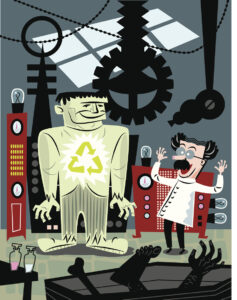Today’s progressives like to imagine they’re clever when it comes to engineering a carbon-free future. Yet when we look at the record, we see green policies yielding self-defeating public backlashes.
The effort by California’s legislature to ban all gas-powered vehicles by 2035, for example, has wreaked havoc on the state’s economy. It’s produced not only the nation’s highest energy prices and last summer’s rolling blackouts but the need to import expensive electricity from neighboring states. And while European governments would like to blame Vladimir Putin’s war on Ukraine for their countries’ high energy costs, angry voters know that prices began spiking years ago, when green activists forced the shutdown of coal plants across the continent.
Most recently, the $370 billion in subsidies for renewable technology that environmentalists lobbied to get into the Inflation Reduction Act has so disrupted longstanding free-trade agreements with Europe that France, the Netherlands, and other countries are openly threatening retaliation. In early December, Thierry Breton, the European Union’s internal market commissioner, took the unprecedented step of pulling out of scheduled US-EU Trade and Technology Council meetings because the agenda “no longer gives sufficient space to issues of concern to many European industry ministers and businesses.”
The consequences of green policymaking have so consistently antagonized the voting public that a growing number of research firms have begun to ask whether net-zero activists are even capable of thinking intelligently about the environment. McKinsey & Company points out that Germany alone would have to spend $200 billion annually — more than it currently devotes each year to public education, policing, the courts and its prisons — in order to power itself with sun and wind. Phys.org News has calculated that deploying a sufficient number of solar panels and wind turbines to meet America’s energy needs would require a surface area of at least 590,000 square kilometers, a land mass equal to the New England states, Illinois, Indiana, and Ohio combined.
When forced to discuss alternatives to wind and solar, greens remain comfortable debating nuclear power because, despite recent advances in the construction of safe reactors, they know that anything “atomic” is still a nonstarter with a large section of the electorate. What activists do not like to talk about is the ongoing development of many non-nuclear technologies that also promise to reduce atmospheric carbon, but without the regulatory bureaucracies, massive government subsidies, and huge land grabs.
Take Exxon-Mobil’s October deal with CF Industries to capture, transport, and safely store the carbon produced by CF’s Donaldsonville, Louisiana, ammonia factory. ExxonMobil Low-Carbon Solutions president Dan Ammann says his division plans to spend $15 billion on carbon-capture over the next five years and believes the technology is sufficiently advanced to justify an even greater outlay.
Then there is the recent $4.1 billion British Petroleum (BP) purchase of Houston-based Archaea Energy, which has been aiming to replace fossil fuel gas from wells with naturally occurring biogas from landfills. BP is following along with Shell Oil, which has its own $2 billion investment in making biomethane from organic waste. The seep from landfills is admittedly not as plentiful as what typically flows from a shale well, but the output lasts much longer and is easier to extract.
Early in 2022, Chevron Corp. committed $3.15 billion to Iowa-based Renewable Energy Group (REG), which makes diesel fuel from low-carbon waste products, such as tallow and used cooking oil. Chevron and other oil companies have also been building and acquiring refineries that can extract clean burning hydrogen from water. As a fuel that produces no atmospheric emissions, hydrogen has an especially promising future in shipping, long haul trucking, aviation, and other industries where the batteries that could supply the required power would be too big to store.
It is not a coincidence that these prospects have either been developed by major oil companies or represent promising opportunities for the petroleum industry as a whole. For most environmental activists have long been progressives. And today’s progressives are heir to a far-left movement that has long prioritized taking down fossil fuel producers.
Whether it was John D. Rockefeller’s 1865 founding of the first modern multinational corporation Standard Oil, the oil industry’s attempt to stifle the 1905 communist uprising in the Caspian Sea oil fields, its collaboration with the CIA and Britain’s MI6 to support pro-Western regimes during the 1950s and ‘60s, development of North Sea and Alaskan oil resources at just the moment when declining gas prices would boost the popularity of both Ronald Reagan and Margaret Thatcher, or the industry’s more recent leverage of advanced technology to regain control of formerly nationalized assets, the left has always viewed oil companies as an intolerable enemy.
Yet were today’s environmental activists as single-mindedly dedicated to cleaner air as they like to claim, they would recognize that the first step to achieving a difficult task is trying to build a more constructive relationship with former adversaries. If nothing else, oil companies have the financial clout that enables them to risk the kinds of costly mistakes that are inevitable when trying to develop radically new energy sources. BP, for example, has committed to spending at least 40 percent of its future capital budgets to transition away from oil and gas production. Together, BP and Shell have already invested heavily in electric car charging stations around Central London.
Genuinely committed greens would also note that the petrochemical industry already has an infrastructure that is well-suited to fossil fuel alternatives. Hydrogen, for example, could easily be transported along the same pipelines currently used to move natural gas.
Instead progressives are continuously distracted from their goal of a cleaner environment by their obsession with taking down a former enemy. Far-left attempts to cripple oil company finances with onerous regulations from government agencies like the Securities and Exchange Commission and the Federal Reserve, for example, have only limited what industry players can invest in promising technologies.
Similarly, the effort by groups like Greenpeace and the Union of Concerned Scientists to have social media content moderators automatically tag oil company views as “disinformation” undermines the public’s trust in any climate change discussion. As former green activist Paul Kingsnorth writes, “an entirely human-centered piece of politicking, disguised as ‘concern for the planet,’” is undermining what could be a far more effective approach to the environment. Just as the left’s rigid enforcement of woke racial theories has ended up dividing Americans on civil rights issues, so too the idea that “carbon [emitters] must be ‘tackled’ like a drunk with a broken bottle – quickly, and with maximum force” is only causing thoughtful voters to question what greens really stand for.
Activists do not even seem to be aware how constantly demonizing industry only undermines their own personal effectiveness. According to research reported by Climate One, the kind of politicking that constantly presupposes a rapacious foe, willing to destroy the planet for its own selfish purposes, is highly correlated with chronic sleeplessness, loss of appetite, feelings of grief, hopelessness, and even suicidal thoughts.
Progressives who really want to engineer a cleaner future can start by recognizing that, whatever the past, genuine progress is more likely to come from reconciliation and collaboration than revenge for presumed injustices. The speed and creativity with which oil companies have responded to the demand for cleaner energy should, if nothing else, be a reminder that the best ally to have in any cause is the most entrepreneurial one.





